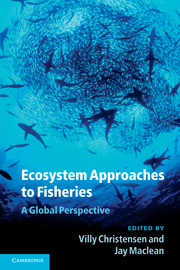Book contents
- Frontmatter
- Contents
- List of contributors
- Foreword
- Preface
- Acknowledgments
- 1 Introduction: toward ecosystem-based management of fisheries
- I Life in the oceans
- II Evaluating impact on marine life
- III Managing living resources
- IV The human side
- V Impacting policy
- 17 Linking conservation policy and science
- 18 Using the science
- 19 The scientist as communicator
- 20 Scenario development for decision making
- 21 The relationship between science and ocean policy
- Index
17 - Linking conservation policy and science
Published online by Cambridge University Press: 05 June 2012
- Frontmatter
- Contents
- List of contributors
- Foreword
- Preface
- Acknowledgments
- 1 Introduction: toward ecosystem-based management of fisheries
- I Life in the oceans
- II Evaluating impact on marine life
- III Managing living resources
- IV The human side
- V Impacting policy
- 17 Linking conservation policy and science
- 18 Using the science
- 19 The scientist as communicator
- 20 Scenario development for decision making
- 21 The relationship between science and ocean policy
- Index
Summary
For much of human history, people have waged war on nature, taming and transforming wild landscapes in ways that were perceived to benefit society. It is only rather recently that we have become aware that the domestication of wild places, and the commoditization of wild things, may ultimately do the human race great harm. Not only do wilderness systems and the life they contain provide us with a wide array of previously underappreciated services, but also we are rapidly running out of both. Unfortunately, we are coming to this realization somewhat late and, even then, awareness of the problem is far from uniform.
For thousands of years, the evolving conflict between human society and the natural world has been conspicuous mainly on land, because that is where most of it has occurred. Similarly, scientists who have devoted attention to chronicling and understanding the impact of human activity on nature have focused primarily on terrestrial systems. Relatively little emphasis has been placed on changes taking place in the sea because much of it has remained inaccessible for so long. Indeed, for most of the human experience, the world's oceans appeared so vast and limitless as to be impervious to the efforts of people who were barely able to navigate their outer edges, much less observe what was happening beneath the surface. With the exception of those areas along the shoreline that were readily accessible and, therefore, vulnerable to human exploitation, this was generally the case. It is not anymore.
Information
- Type
- Chapter
- Information
- Ecosystem Approaches to FisheriesA Global Perspective, pp. 283 - 289Publisher: Cambridge University PressPrint publication year: 2011
